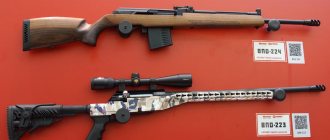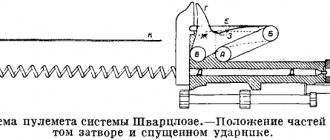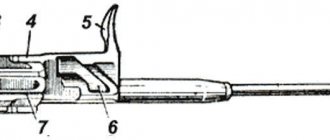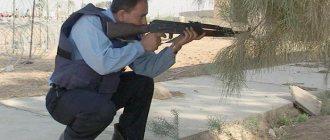In what cases can a private security guard use weapons?
February 18, 2022 — 00:11
0 745
Use of weapons in security
In what cases can a private security guard use weapons?
Private security guards guarding the facility entrusted to them may also use firearms. The Law on Private Detective and Security Activities allows them to do this.
Article 16 of this law contains a precise definition in which cases a private security guard can shoot without warning the attacker:
- If he hesitates, the guard may lose his life or health.
- If the violator’s actions can cause irreparable harm.
Here, naturally, the question may arise: what specific actions of the attacker may pose a threat to the life and health of the security guard. There is no clear list of such actions in the law. The security guard must proceed from sound logic, as well as his own everyday and professional experience.
It is clear that if an attacker is trying to strangle a security guard, or push him out of a vehicle, or is actually trying to hit him with a car, or is trying to take away a weapon, then, most likely, a firearm should really be used without warning.
By the same token, a security guard has the right to shoot without warning if the attacker, for example, intends to throw a grenade, detonate an explosive device, or cause imminent harm to many people in some other criminal way.
The law in this case is not very specific, and such vagueness can lead the guard to such actions, having committed which, he will then be held accountable before the law.
By the way, you should definitely keep in mind that a security guard has the right to use weapons (even with a warning, even without warning anyone) when he directly performs professional duties - the protection of an object or property entrusted to him, and when he has sufficient professional qualifications.
In accordance with the law, only security guards who have the highest qualifications (6th grade) can carry and, therefore, use weapons.
In ordinary life, a security guard must be guided by other laws, as an ordinary citizen should.
In conclusion: defending yourself with firearms in the Russian Federation is a rather thankless and dangerous task. Even police officers and military personnel can be held accountable for its misuse, let alone ordinary citizens or private security guards. This should be done only in the most extreme and inevitable cases.
It is better to sacrifice protected or personal property than (which is very likely) to be held accountable to the law for exceeding the limits of necessary self-defense.
Legal advice 24/7
Today, regulations governing the use of weapons are an integral part of the national legislation of developed countries.
In the Russian Federation there is no single legal act regulating the use of firearms. The use of weapons is addressed in a number of Russian laws and by-laws: in the federal laws “On the Police”, “On the State Border of the Russian Federation”, “On Departmental Security”, “On the Federal Security Service”, “On the National Guard Troops of the Russian Federation” "", "On federal courier communications", "On institutions and bodies executing criminal penalties in the form of imprisonment", "On state security", "On bailiffs", "On customs regulation in the Russian Federation", "On the prosecutor's office of the Russian Federation ", "On the Investigative Committee of the Russian Federation", "On weapons", "On subsoil", "On the safety of fuel and energy complex facilities", "On the hydrometeorological service", "On private detective and security activities in the Russian Federation"; in the instructions for organizing the registration, storage and issuance of military hand-held firearms in the prosecutor's office of the Russian Federation, in the charter of the military police of the armed forces of the Russian Federation, in the Government Decree “On approval of the procedure for the use of weapons and military equipment when protecting the state border of the Russian Federation in the underwater environment "and this list is far from exhausted. Procedure, prohibitions and conditions for the use of firearms by federal executive authorities, legal entities with special statutory tasks, armed with military and service weapons: comparative legal analysis
Discussions regularly flare up in society about the extent to which the use of firearms is permissible to protect the life, health, property and legal rights of citizens. Some call for tightening the current legislation and allowing the use of weapons only in cases that threaten the life and health of citizens, while others, on the contrary, call for increasing the “radius of possibilities” for the use of firearms in order to ensure the full protection of their constitutional rights. These discussions are a reflection of the situation not only in the country, but also the situation in the world, where two polar points of view have also formed on the issue under discussion. Given the significant public interest, we conducted an analysis of the legal norms regulating the use of weapons by employees of federal executive bodies, officials of state bodies and employees of legal entities with special statutory tasks in order to find out what position the Russian legislator took on this issue.
In accordance with Art. 5 of the Federal Law “On Weapons”, military weapons are in service with the following federal executive authorities: the Ministry of Defense of the Russian Federation, the Ministry of Internal Affairs of the Russian Federation, the Ministry of the Russian Federation for Civil Defense, Emergency Situations and Disaster Relief, the Foreign Intelligence Service of the Russian Federation , Federal Security Service of the Russian Federation, Federal Courier Service of the Russian Federation, Federal Migration Service, Service of Special Facilities under the President of the Russian Federation, Federal Agency for Special Construction, Federal Service of National Guard Troops, Federal Service for the Execution of Punishments, Federal Bailiff Service, Federal Customs Service, General Prosecutor's Office of the Russian Federation, Investigative Committee of the Russian Federation.
In accordance with Art. 4 of the Federal Law “On Weapons”, service weapons are intended for use by officials of government bodies and employees of legal entities with special statutory tasks, which include:
- private security organizations;
- organization of departmental security;
- strategic enterprises operating main oil and gas pipelines;
- banks performing functions that are particularly significant for the state;
- Main center for special communications of the federal executive body;
- organizations that carry out the functions of protection, control and regulation of the use of wildlife and their habitats;
- organization of a specially authorized federal executive body in the field of hydrometeorology and related areas operating at hard-to-reach stations;
- government institutions that carry out state forest control and supervision;
- organizations conducting field work on regional geological study of subsoil and geological study, including the search and assessment of mineral deposits, in the Far North and equivalent areas, as well as in other sparsely populated and inaccessible areas.
Accordingly, employees of federal executive bodies, officials of state bodies and employees of legal entities with special statutory tasks to whom they are issued and who are entitled to use them to suppress illegal acts have the right to use firearms. Having analyzed these standards, it can be noted that when using firearms, all employees must:
- warn of the intention to use a weapon and provide time to comply with the requirements, and in exceptional cases, when delay in using a firearm creates an immediate danger to the life or health of citizens or an employee or may lead to other grave consequences, act without warning;
- strive, depending on the nature and degree of danger of the crime, the degree of danger of the persons who committed it, and the strength of the counteraction provided, to ensure that any harm caused is minimal;
- provide first aid to persons injured as a result of the use of firearms;
- report to the subordinate on each case of use of firearms;
- Notify the prosecutor of each case of injury or death resulting from the use of a firearm.
All regulatory legal acts regulating the use of weapons contain rules establishing a ban on their use. Legal provisions limit the use of firearms by employees to an exhaustive list of cases. It is prohibited to use firearms in large crowds of people, when strangers may be harmed, as well as against women, persons with obvious signs of disability and minors, when their age is obvious or known, except in cases where these persons offer armed or group resistance or commit armed or group attack that threatens the life or health of citizens or an employee. The exception is for employees of the National Guard of the Russian Federation and employees of the federal security service, who are allowed to use weapons in large crowds of people in order to prevent (suppress) a terrorist act, free hostages, repel a group armed attack on critical and potentially dangerous objects or objects, buildings , premises, structures of government bodies.
Grounds for the use of weapons are certain conditions that, when met, give rise to the right for an employee to use firearms. In the conditions of use of weapons listed in the laws, there is either a state of necessary defense, or extreme necessity, or a situation of detaining a person who has committed a crime. Cases of the use of weapons directly depend on the special functions and tasks performed by one or another federal executive body, a legal entity with special statutory tasks. Thus, employees of the General Prosecutor's Office and the Investigative Committee of the Russian Federation have the right to use weapons only when repelling an attack on them, or when protecting family members and personal property from criminal attacks, and only in a state of necessary defense or extreme necessity. Moreover, the use of weapons in a state of necessary defense should not cause harm to third parties.
All other employees have the right to use weapons in the following cases: to protect another person or themselves from an attack, if this attack involves violence dangerous to life or health; to suppress attempts to seize weapons, special cargo, vehicles, communications equipment, military equipment, etc.; to repel a group or armed attack on objects, buildings, premises, structures, vehicles and other objects; to warn of the intention to use a weapon, sound an alarm or call for help. Also, all employees, with the exception of bailiffs and employees of federal courier communications agencies, are allowed to use weapons to stop automobile and railway vehicles, water and aircraft by damaging them, if they create a real danger to the life and health of citizens or officials or do not obey their repeated demands to stop after warning shots; to neutralize animals that threaten the life and health of citizens or employees.
Employees of the National Guard troops, the Ministry of Internal Affairs, the Ministry of Defense, employees of the federal security service, the federal security service, the federal penitentiary service, have the right to use firearms in the same cases: to free hostages, suppress terrorist and other criminal attacks; to detain persons caught committing an act containing signs of a grave or especially grave crime against life, health or property, and trying to escape or offering armed resistance; to suppress the escape from places of forced detention of suspects and accused of committing crimes, as well as to suppress attempts at the forcible release of these persons.
National Guard troops and federal security officers have the greatest authority to use firearms. In addition to the cases of using weapons listed above, they are also allowed to use weapons to destroy locking devices, elements and structures that prevent entry into residential and other premises belonging to individuals and onto land plots belonging to them, into the territory and premises of organizations, regardless of their form of ownership. . Employees of the National Guard troops and the Ministry of Defense have the right to use weapons in all cases where the use of military and special equipment is permitted, and also have the right to use weapons without warning when repelling an attack using weapons, military and special equipment, vehicles, aircraft, naval or river boats.
All rules and regulations regarding the use of firearms by employees are based on the following guiding principles:
- defining the warning that is given in certain cases before discharging a firearm;
- prohibiting the use of firearms and ammunition that cause extremely serious injury or pose an unreasonable risk;
- reporting in all cases where employees use firearms in the performance of official duties;
- controls the storage and issuance of firearms, including procedures to ensure that employees are held accountable for the firearms and ammunition issued to them;
- ensuring that firearms are used only in certain circumstances and in a manner that minimizes the possibility of causing excessive harm;
- determining the circumstances under which employees are authorized to possess firearms;
- defining the types of firearms and ammunition that are authorized for use by employees.
Thus, we see that the legislator quite strictly and clearly defines the procedure for the use of weapons, provides an exhaustive list of circumstances under which the use of weapons is prohibited, and specifically defines the conditions and limits of the use of weapons, which are determined by the tasks and functions performed by employees. In conclusion, I would like to note that the use of firearms by employees, to whom this right is assigned by regulatory legal acts, is regulated not only by special departmental laws establishing the grounds, procedure and conditions for the use of weapons, but also by criminal law norms that establish circumstances excluding the criminality of this act . Compliance with all conditions is important not only for achieving optimal results in the suppression of criminal acts, but also for the legal assessment of the actions of employees.
GORYACHEVA Natalya Yurievna Candidate of Legal Sciences, Associate Professor of the Department of Fire and Tactical-Special Training, Ufa Law Institute of the Ministry of Internal Affairs of Russia
If you liked the article, share it with your colleagues.
0








